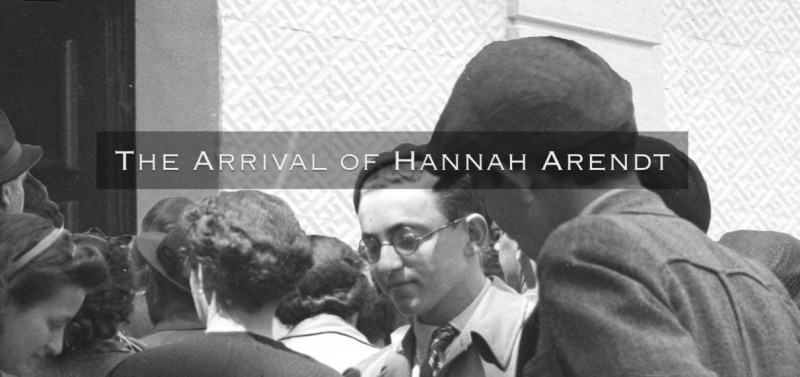
The Arrival of Hannah Arendt
This film describes the arrival of Hannah Arendt - a Jewish, German-American political theorist and publicist - in New York and her reflections on flight and helping people start over.
Fifty-four West. Fifty-third Street, New York, N.Y.
February 23rd, 1938
Mr. Oswald Garrison Villard,
20 Vesey Street
New York, N.Y.
Dear Mr. Villard:
I am sorry to have delayed sending you the enclosed information regarding Dr. Alice Salomon of whom I spoke to you by telephone several days ago, but I have not had regular secretariat service during the week.
Both Mrs.Catt and I are very much concerned over Dr. Salmon’s physical condition. She is absolutely without any *regular source of income. At the age of sixty-six, with increasing deafness and heart complication, and an anemia so severe that she is compelled to take expensive liver injections, with the shock of having been forced to leave her country and readjust completely, Dr. Salomon is on the verge of a complete break. Because she lived in my neighborhood, I have seen her frequently during the past months.
Dr. Salomon has sufficient provision made for necessities during the year but has not a sufficient income to provide proper secretariat service for an important and interesting book to be brought out next fall by the Oxford Press, nor for assistance in her household regime. She is obliged to do her own marketing and cooking which interrupts her work seriously. Dr Salomon is not in a state of health to enable her to attempt a lecture tour. The fact that she is Jewish by birth but became converted to Christianity in her school days, being baptized in the Lutheran faith in 1914, of course prevents her from receiving any assistance from committees organized for the purpose of helping Jewish exiles.
Anything you might be able to do to add security to Dr. Salomon’ s situation would be greatly appreciated by those who are interested in her. The reason given for Dr. Salomon’s exile, after years of distinguished service in Germany, was the fact that she has so many interests and affiliations in international affairs.
Sincerely yours,
Valeria H. Parker, M.D.
*friends here and abroad have given Dr.Salomon enough to cover necessities for a time but she is preparing her own food and finishing her book without proper secretarial assistance
Lecturer < > Counsel on Marriage and Social Relationships < > Consultant
Alice Salomon (1872-1948), born in Berlin, was a German liberal social reformer of jewish origin. She had wanted to become a teacher, but was not able to go to university, due to educational rules for women from her social standing. In 1983 this rule changed and she studied history, philosophy and economics at the Friedrich Wilhelm University from 1902-1906. Salomon made it her life’s mission to help and educate women while supporting the international Women’s movement. She was part of the Mädchen- und Frauengruppen für soziale Hilfsarbeit, which she took over in 1899. She was also part of the Bund Deutscher Frauenvereine, of which she became the chairwoman in 1900. She became a doctor of philosophy in 1906 with her dissertation namely Die Ursachen der ungleichen Entlohnung von Männer- und Frauenarbeit. She became the secretary of the International Women’s council in 1909. In 1920 she stopped her work with the BDF due to anti semitic propaganda, and went on to found the Deutsche Akademie für soziale und pädagogische Frauenarbeit.
She fled Germany in 1937 after being told to do so by the Gestapo, or else she would face incarceration. Some reasons for this may include her jewish origin and international involvement. She emigrated to the United States and her German citizenship was revoked. As she moved very late in life, it was hard for her to adjust, as described in this letter. She was never able to complete her Autobiography, although her memoirs were published in 1983.
The American Guild for German Cultural Freedom was an organization that helped German artists, writers and intellectuals in exile whose ability to work was affected by the facist government in Germany. The goal of the organization was to help keep German culture alive outside of Germany, as it was unable to survive and prosper within its borders. The American Guild for German Cultural Freedom helped these people through financial aid. The refugee experience of the German exiles varied for each individual. One of the main struggles of refugeedom is the adaptation to a completely new place and finding a support system. The American Guild for German Cultural Freedom tried to help German exiles with that adaptation, so that they would be able to simultaneously also focus on their work.
Letter from Valeria H. Parker to the American Guild for German Cultural Freedom, February 1938 © Deutsches Exilarchiv 1933–1945 der Deutschen Nationalbibliothek – German Exile Archive 1933-1945 from the German National Library.